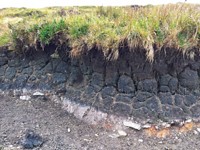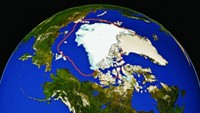Advertisement
Grab your lab coat. Let's get started
Welcome!
Welcome!
Create an account below to get 6 C&EN articles per month, receive newsletters and more - all free.
It seems this is your first time logging in online. Please enter the following information to continue.
As an ACS member you automatically get access to this site. All we need is few more details to create your reading experience.
Not you? Sign in with a different account.
Not you? Sign in with a different account.
ERROR 1
ERROR 1
ERROR 2
ERROR 2
ERROR 2
ERROR 2
ERROR 2
Password and Confirm password must match.
If you have an ACS member number, please enter it here so we can link this account to your membership. (optional)
ERROR 2
ACS values your privacy. By submitting your information, you are gaining access to C&EN and subscribing to our weekly newsletter. We use the information you provide to make your reading experience better, and we will never sell your data to third party members.
Environment
West Antarctica Ice Decreases
Region considered stable appears to be losing ice faster than thought, thanks to climate change
by Bette Hileman
January 15, 2008

West Antarctica and the Antarctic Peninsula appear to be losing vast amounts of ice, and that loss is accelerating, researchers reported on Jan. 13 in an article published online in Nature Geoscience (DOI: 10.1038/ngeo102). Their findings contrast sharply with estimates in the latest report of the United Nations Intergovernmental Panel on Climate Change (IPCC), which predicted that the ice in Antarctica is likely to remain stable or increase over the course of the 21st century.
Eric Rignot, professor of earth system science at the University of California, Irvine, and his colleagues analyzed satellite data and computer simulations of snow accumulation during the decade from 1996 to 2006. They found that West Antarctica lost about 132 billion metric tons of ice in 2006, compared with about 83 billion tons in 1996, and that the Antarctic Peninsula lost 60 billion tons in 2006.
"To put these figures in perspective, 4 billion tons of ice is enough to provide drinking water for the whole of the U.K. population for one year," says Jonathan L. Bamber, a professor at the University of Bristol, in England, and one coauthor of the article.
The total loss of ice from Antarctica in 2006 was enough to raise global sea level 0.5 mm, Rignot says. In contrast, snow accumulation in East Antarctica roughly balanced the ice loss there.
For the latest estimate, Rignot and his colleagues used data from European, Japanese, and Canadian weather satellites. NASA has no satellites that can measure ice loss in Antarctica.
The reason IPCC estimates for ice loss in Antarctica are so different, Rignot says, is that the panel looked only at trends in precipitation, predicting that it would increase in a warmer world and that air temperatures would not rise enough to melt ice. But in fact, the warm Antarctic Circumpolar Current that circles Antarctica is coming closer to land and has destabilized some of the glaciers based deep underwater, Rignot says. And because many glaciers in West Antarctica are grounded below sea level, they are being impacted, he explains. The only logical reason for the changes in the current is global warming, he adds.
According to Rignot, the yearly ice loss from Antarctica is approaching that from Greenland. However, he says, "I am more worried about Antarctica than Greenland, because many of Antarctica's glaciers are grounded below sea level and can be destabilized by warm ocean water, in contrast to most of Greenland's glaciers, which are based above sea level." Antarctica has 90% of the world's ice and 70% of its freshwater.
"It will take some time for the research community to accept that there is a massive ice loss from Antarctica," Rignot says. In 2005 when ice loss data were first published about Greenland, hardly anyone accepted the findings. Now, very few researchers would dispute the idea that Greenland is losing large amounts of ice, he explains.





Join the conversation
Contact the reporter
Submit a Letter to the Editor for publication
Engage with us on Twitter